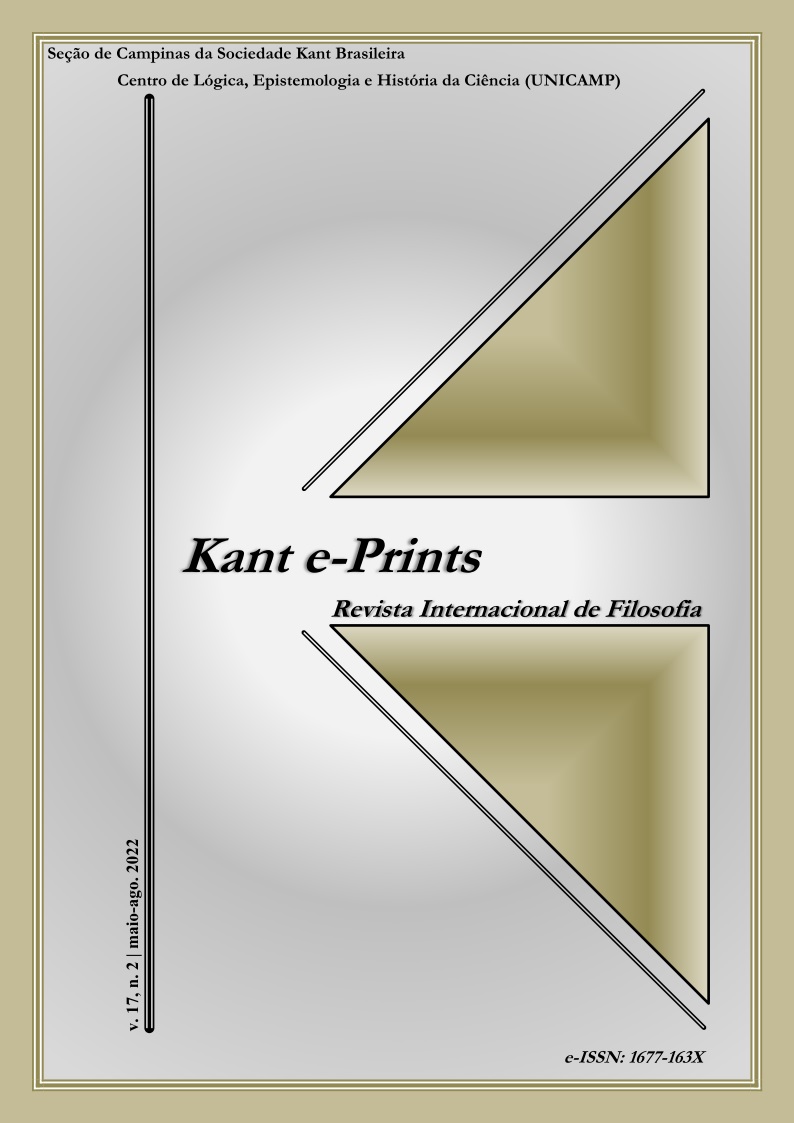Resumo
Este artigo pretende apresentar as “representações obscuras” como parte da via disponível para se conceber um cultivo de si e da civilização, de acordo com a perspectiva de uma antropologia pragmática tal como concebida por Kant. As representações obscuras marcam a existência de um campo de representações intelectuais, estéticas e morais ocultas à consciência. Estas representações possuem, de um lado, a finalidade de fornecer um cultivo de si, espécie de conhecimento da natureza humana, por meio de sua funcionalidade empírica na produção de determinados fenômenos, e, de outro, proporcionar as condições adequadas para a construção da civilização, por meio da “arte de ocultar” as verdadeiras intenções nos comportamentos em sociedade. Nos dois casos, o estudo dessas representações contribui para a compreensão do interior do ser humano, fornecendo uma via adequada para seu uso pragmático-prudente no mundo, o que justifica o prevalecimento privilegiado do tema nos escritos de antropologia.
Referências
Azevedo, J. (2020, maio-ago.). Kant e a antropologia assimétrica: Cosmopolitismo e dependência da ‘natureza’ humana. Kant e-prints, 15(2), 125–153.
Baumgarten, G. A. (2014). Metaphysics. Bloomsbury.
Brandt, R. (1999). Kritscher kommentar zu Kants Anthropologie in pragmatischer Hinsicht. Felix Meiner.
Elias, N. (2011). O processo civilizador. Zahar.
Heidemann, D. (2012). The ‘I Think’ must be able to accompany all my representations. In P. Giordanetti, R. Pozzo, & M. Sgarbi (Eds.), Kant’s Philosophy of the Unconscious (pp. 37-59). Walter de Gruyter.
Kant, I. (1900ff). Gesammelte Schriften Hrsg.: Bd. 1–22 Preussische Akademie der Wissenschaften, Bd. 23 Deutsche Akademie der Wissenschaften zu Berlin, ab Bd. 24 Akademie der Wissenschaften zu Göttingen.
Kant, I. (2006). Antropologia de um ponto de vista pragmático. Iluminuras.
Kant, I. (2012). Crítica da razão pura. Vozes.
Kant, I. (2006). Manual dos cursos de Lógica geral. UNICAMP.
La Rocca, de C. (2007). L’intelletto Oscuro. Inconscio e Autocoscienza in Kant. Leggere Kant. Dimensioni della filosofia critica (pp. 63-116). Edizioni ETS.
La Rocca, C. (2003). Soggetto e mondo. Studi su Kant. Marsilio.
Madrid, N. S. (2016). A civilização como destino. Nefipoline.
Madrid, N. S. (2012). A Linneaus of Human Nature: The pragmatic Deduction of Unconscious Thought in Kant’s Lectures on Anthropology. In P. Giordanetti, R. Pozzo, & M. Sgarbi (Eds.), Kant’s Philosophy of the Unconscious (pp. 177-232). Walter de Gruyter.
Martínez, L. M. (2014, dez.). Las nociones de claridad y oscuridad en los Apuntes de Lecciones de Antropología de la “década silenciosa” de Kant. Studia kantiana, 17, 27-50.
Rohden, V. (2009, jan.-jul.). Representações não-conscientes em Kant. Revista AdVerbum, 4(1), 3-9.
Williams, R. (1969). Cultura e sociedade. Nacional.
Wolff, C. (2012). Psychologia Empirica. Nabu Press.

Este trabalho está licenciado sob uma licença Creative Commons Attribution 4.0 International License.
Copyright (c) 2023 Aline Brasiliense dos Santos Brito

